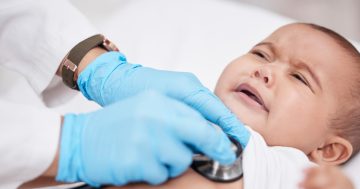The Canberra Times has the unhappy news that a canteen “food handling issue” at Lyneham High is going to have around 1,000 children and staff vaccinated for Hepatitis A:
Acting ACT Chief Health Officer Dr Andrew Pengilley said the risk of exposure was low, but the Government was offering food vaccinations to all students and staff who might have consumed freshly prepared food recently.
The vaccinations will take place on Monday and Tuesday, and the school has been informing parents.
UPDATE: The Health Directorate has finally posted on the subject:
A person involved in food preparation at the school canteen has been confirmed as having Hepatitis A.
Hepatitis A is a viral infection which can be spread in food which is prepared by people who have this virus. The risk of food handlers transmitting hepatitis A is generally low, and the risk of transmission to people at the school who may have eaten food from the canteen.
Vaccination with Hepatitis A vaccine within two weeks of exposure has been shown to reduce the risk of people becoming infected when exposed to hepatitis A. ACT Health will therefore be offering free vaccination clinics at Lyneham High on Monday and Tuesday next week.
Hepatitis A is relatively uncommon in the ACT and so, unless people have already been vaccinated because of, for example, travelling to countries where the disease is more common, it would be expected that people would not have pre-existing immunity.
Infections with hepatitis A can be mild or asymptomatic, particularly in younger people, and adults tend to have more severe disease.
When people become unwell with hepatitis A they develop general symptoms such as fever, tiredness, nausea and abdominal discomfort which can last for days to a few weeks (4-10 days), followed by darkening of the urine and jaundice.
Symptoms can be mild or severe, but Hepatitis A does not cause ongoing hepatitis like Hepatitis B or C which people may have also heard of. People have generally recovered within a few weeks (1 month) of the onset of their illness.
The risk of people getting sick from people preparing food while unwell with Hepatitis A is generally low, and is highest for foods which are served uncooked like sandwiches. The risk to people who have only eaten commercially pre-packaged food from the canteen, like chips or fizzy drinks, is extremely low.
Letters have been sent to parents and staff at the school.
How can Hepatitis A be prevented?
Hepatitis A infection can be prevented by:
washing hands thoroughly after going to the toilet, before preparing and eating food, and after handling soiled linen e.g. nappies;
not sharing food, cutlery, crockery, cigarettes and drinks with other people;
when travelling in regions with poor sanitation, drinking bottled water and avoiding food that may have been cleaned or prepared using contaminated water; and
vaccination.





















